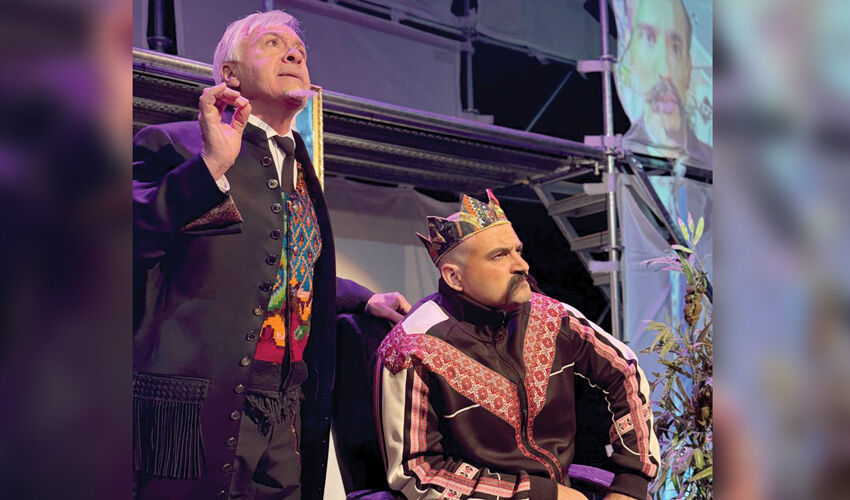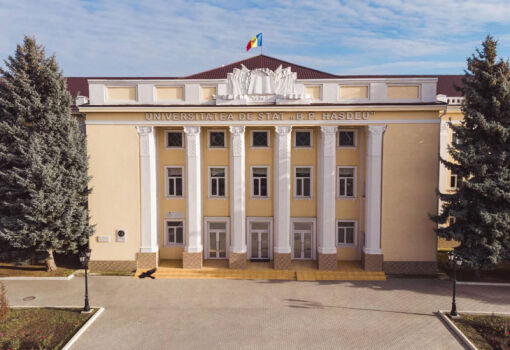
scene from a play
The main character – a village boy Ionel Ivanovich – goes to the capital in search of a bride and a job. But instead of the personnel department gets into the royal palace, where the Tsar plays on the console, the Princess Mariuca leads social networks. To get the promised privileges and the hand of Princess Mariuca, the hero will have to do the impossible.
Screenwriter Iacov Gribinenco, who is also the performer of the role of Ionel Ivanovich, admitted that he wanted to create a superhero tale based on Moldovan folklore primarily for his five-year-old son. “Now we are competing with the American Marvel movie universe, and I have nothing against Captain America, Spider-Man and others. But our heroes are undeservedly forgotten. So I strived to come up with a story in which Moldovan characters would also become superheroes.”
Iakov has a book “Moldavian Folk Tales” from the 1960s, from which he collected about 40 fairy tales into a story, line by line, bit by bit. He also included replicas from modern movies, references to Russian, Bulgarian fairy tales and other nations, which are also part of our cultural code, and much more.
Yakov Gribinenko graduated from the theater department of the Slavic University in 2016, specializing in theater and film actor (course of Iurie Harmelin, Maestru în artă RM). From 2013 to 2024 he worked as an actor at the State Youth Drama Theater “From Roses Street” named after Iurie Harmelin. In 2025, he was admitted to the troupe of the Chekhov Theater.
In parallel with the theater Iakov Gribinenko creates independent cinema in Moldova, the eighth film “Turchanka” this spring was shown in cinemas in Kishinev. He now has “Bojo – Moldovan Kung Fu” in development. “It’s an ironic story about guys who have crossed the thirty-year mark, going through a crisis,” Iacov comments. – They remained children at their age, but not in the sense of infantilization, but in terms of perception of the world and life. They created a club in the village, called ‘Bojo’, and give themselves Chinese names.
The script of Yakov Hribinenko’s fairy tale reflects the national culture, values and worldview, which director Roman Malay found it necessary and pleasant to familiarize the viewer with.
“This is a universal fairy tale. We have a children’s story in the foreground. But in the background comes the subtext, the one that is understandable to adults. At the expense of folkloric, well-known characters, it is easier for us to convey today’s realities. That’s why we have a lot of humor and irony.
What would happen if Pekale and Tyndale lived in the XXI century? What if Baba Kloanza existed next to us? What will be immediately and unequivocally clear for children, adults will be able to think, dig, who we see in this or that hero. Who is the king nowadays, why does he have such a crown, such a costume?
The performance actively uses new technologies: projection, silicone masks, AI. And at the same time real toys – a wonderful sheep and a horse, which were made by our artist Ekaterina Salimova. Children will be able to play with them.
This is the magic of bringing fairy tale characters from other centuries into the modern world”.
Roman Malai graduated from the Academy of Music, Theater and Fine Arts in 2017 with a degree in Theater and Film Actor (course of Silvia Berova, Maestru in arta RM, and Vlad Ciobanu). In 2020, he obtained a second degree at the University of Babeș-Bolyai (Cluj-Napoca, Romania), specializing in Theater Directing. As a student of AMTII, he participated in the performances of the Republican Puppet Theater “Licurici” and the Chekhov Theater. Now he is an actor at the National Theater “Satiricus Ion Luca Caragiale”, an actor and assistant director at the Chekhov Theater.
Roman has also twice participated in directing workshops in Moscow, organized by the Union of Theatre Workers of the Russian Federation. They were led by Vladimir Pankov, a well-known Russian theater and film director, theater and film actor, musician, composer, and teacher.
“The play “How I. I. in people got out” is not psychological, although some actors are looking for something in it, “digging” in their characters – explains the director. – But here there is no need to complicate anything – there is a situation, a fairy-tale hero, and it must be played”.
“In his performances Roman Malay brings together talented people not only from the Chekhov Theater,” says Victoria Akimova-Krudu, head of the literary department. – For example, stage designer and lighting designer Milen Kelya, who had the difficult task of creating a voluminous two-tiered set in a very small space. And to add modern elements to the performance in the form of projection. Or the young composer Ilya Vivich, who is writing music for the director’s second production. Roman with his interactive productions creates a new theatrical reality in which the audience becomes active participants in the performance, interacting with the actors. This is what happens in the current fairy tale and in the play Turandot, which premiered in January of this year”.



